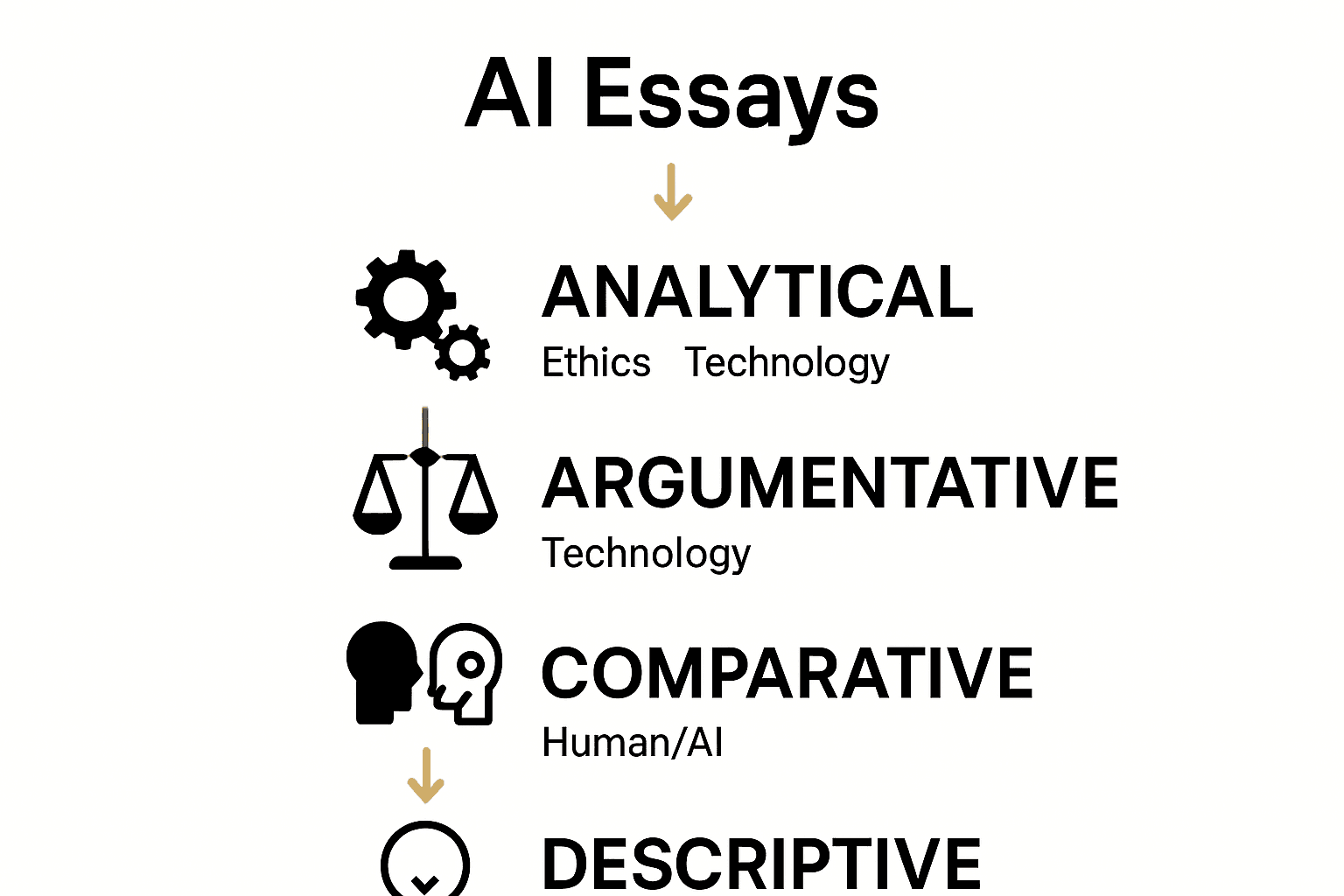Loading...

Did you know that over 44 percent of university students now encounter artificial intelligence in their coursework? As AI technologies shape everything from healthcare to finance, understanding how to analyze and write about these systems has never been more important. Academic essays on artificial intelligence challenge students to think beyond code, weighing ethical questions and technical capabilities. A clear approach helps writers explain, compare, and critique one of the most influential scientific fields of our era.
| Point | Details |
|---|---|
| Understanding AI Essays | AI essays in academia critically analyze computational intelligence, examining the ethical, societal, and technical aspects of artificial intelligence. |
| Types of AI Essays | There are various essay types, including analytical, argumentative, comparative, and descriptive, each focusing on different facets of AI. |
| Effective Essay Structuring | A well-structured AI essay should include an introduction, background, technical analysis, ethical considerations, and a conclusion to effectively communicate complex ideas. |
| Ethical Considerations | Ethical challenges such as bias, privacy, and transparency in AI must be addressed to maintain academic integrity and promote responsible AI development. |
In the rapidly evolving landscape of academic research, Artificial Intelligence (AI) essays represent a critical analytical approach to understanding computational intelligence. According to CS University of Texas, AI is fundamentally defined as "the study of computation required for intelligent behavior and the attempt to duplicate such computation using computers."
These specialized academic essays explore the multifaceted dimensions of artificial intelligence, examining how computational systems can simulate human-like cognitive processes. As Congressional Research Service explains, AI involves creating systems capable of performing tasks traditionally requiring human intelligence - including complex activities like problem-solving, learning, reasoning, and decision-making.
AI essays in academic settings typically focus on several key analytical dimensions:
Successful AI essays demand rigorous research, critical analysis, and a nuanced understanding of both technological capabilities and philosophical questions surrounding machine intelligence. By integrating technical details with broader intellectual discourse, students can craft compelling academic explorations that illuminate the complex world of artificial intelligence.
For students seeking additional guidance on crafting definition-style academic essays, our how to write a definition essay tutorial provides essential tips for developing clear, structured arguments.
Artificial Intelligence (AI) essays encompass a diverse range of compelling topics that explore the intricate landscape of computational intelligence. The Ed Advocate highlights several key areas of focus, including machine learning, deep learning, natural language processing, and the increasingly critical field of AI ethics.
Academic essays on AI can be categorized into several primary types, each offering unique perspectives on technological advancement and societal implications. Paper Help suggests that popular essay approaches often examine AI applications across critical domains such as:
Researchers and students can explore multiple essay types when investigating artificial intelligence, including:
Here's a summary comparing the main types of academic AI essays:

| Essay Type | Core Focus | Common Topics |
|---|---|---|
| Analytical | Technical mechanisms | AI algorithms Learning models System performance |
| Argumentative | Ethical/social implications | AI bias Privacy concerns Regulation |
| Comparative | Human vs. machine intelligence | Cognition Decision-making Learning processes |
| Descriptive | Specific AI innovations | Neural networks Natural language processing Robotics |
These diverse essay approaches allow students to critically engage with AI's complex intellectual landscape.
 For students seeking structured guidance on academic writing, our essay type example guide provides comprehensive insights into developing compelling academic narratives.
For students seeking structured guidance on academic writing, our essay type example guide provides comprehensive insights into developing compelling academic narratives.
Crafting a compelling artificial intelligence essay requires a strategic approach that balances technical depth with critical analysis. Columbia University Computer Science emphasizes that an effective AI essay should comprehensively explore fundamental topics such as logical inference, machine learning, and reasoning with uncertainty.
According to University of Texas Computer Science, a well-structured AI essay must address several critical dimensions, including defining AI, exploring its core goals, and examining its diverse applications. The essay should systematically cover key areas such as:
The typical structure for an AI essay typically follows a robust academic framework:
For students seeking additional guidance on crafting well-structured academic papers, our standard essay format guide offers comprehensive insights into developing clear, compelling narratives that effectively communicate complex technological concepts.
Navigating the complex landscape of artificial intelligence ethics requires careful consideration of multiple interconnected challenges. University Library Guides highlight critical ethical concerns, including systemic bias, privacy violations, potential job displacement, and the critical need for transparency in AI systems.
The ethical dimensions of AI extend far beyond technological implementation. U.S. Department of Education emphasizes the importance of addressing broader societal implications through strategies such as:
Specifically for academic writing, students must be particularly vigilant about maintaining intellectual integrity when engaging with AI technologies. This involves:
For students seeking deeper insights into maintaining academic standards, our guide on types of academic dishonesty provides comprehensive strategies for navigating these complex ethical terrain while preserving scholarly excellence.
The landscape of academic writing has been dramatically transformed by advanced artificial intelligence technologies. Internet Public Library highlights how AI tools can provide crucial support by offering comprehensive resources like essay examples, research papers, and concept clarification mechanisms that significantly enhance writing quality.
Atlas Research emphasizes that AI technologies such as natural language processing and machine learning offer unprecedented opportunities for academic writers through advanced capabilities like:
Effective AI tool utilization requires a strategic approach. Students should consider these critical implementation strategies:
For students interested in exploring cutting-edge AI writing technologies, our guide to AI-powered essays provides comprehensive insights into maximizing technological writing support while preserving academic integrity.
Writing an insightful AI essay means tackling complex topics like ethical challenges, technical mechanisms, and the future of intelligent systems. The process can feel overwhelming when trying to balance detailed research with maintaining originality and academic integrity. If you want to transform your AI essay writing experience and avoid pitfalls like plagiarism or unclear arguments, leveraging advanced tools is essential.

Discover how Samwell.ai can empower you to craft high-quality, original AI essays with ease. Our platform offers a powerful editor, structured essay guides, and real-time AI detection to ensure your work stays authentic. Don’t let the complexity of AI essay topics hold you back. Start refining your writing approach today by exploring our standard essay format guide and learn how to produce clear, compelling arguments on AI ethics, technologies, and applications. Visit Samwell.ai now and take the first step toward essay success.
AI essays can be categorized into four main types: analytical essays focusing on technological mechanisms, argumentative essays discussing ethical implications, comparative essays contrasting human and machine intelligence, and descriptive essays exploring specific AI innovations.
A well-structured AI essay typically includes the following sections: an introduction defining AI, background information providing historical context, technical analysis exploring specific methodologies, ethical considerations discussing societal implications, and a conclusion synthesizing insights.
Key ethical challenges in AI include systemic bias, privacy violations, potential job displacement, and the need for transparency in AI systems, as well as ensuring digital equity and promoting inclusive technological design.
AI tools can enhance academic writing by providing intelligent content generation, sophisticated language analysis, personalized feedback, research material aggregation, and grammar and style optimization.



